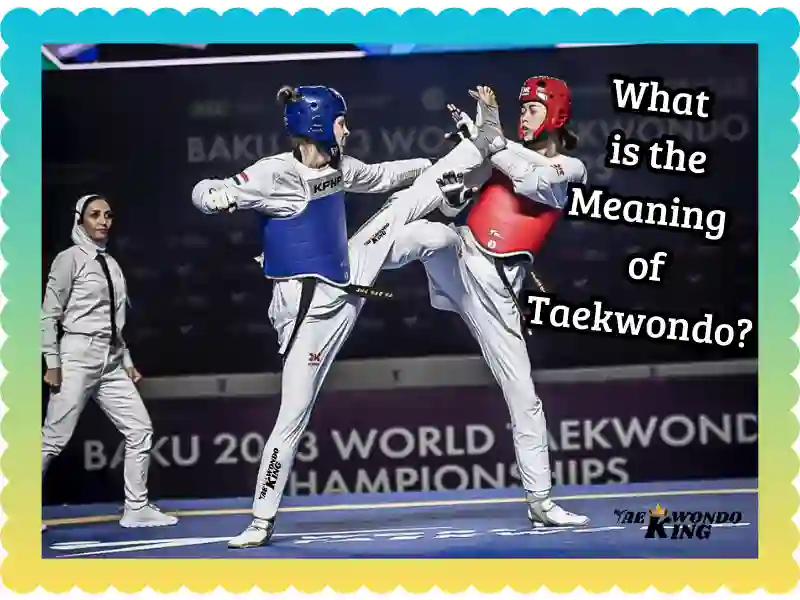
Taekwondo is one of the most widely practiced martial arts globally. It is recognized for its dynamic kicks, strong strikes, and philosophical depth. But what precisely is the meaning of Taekwondo? For both practitioners and enthusiasts, grasping the deeper essence of Taekwondo provides insight into its history, techniques, and principles.
As a martial art, Taekwondo transcends mere self-defense. It represents a discipline integrating physical fitness, mental toughness, and ethical living. This article investigates the meaning of Taekwondo, examining its origins, techniques, and life principles to enhance your understanding of its importance.
What Does Taekwondo Mean?
The term “Taekwondo” comes from three Korean words:
Tae (태): Signifying “foot” or “to strike with the foot. “
Kwon (권): Signifying “fist” or “to strike with the hand. “
Do (도): Signifying “the way” or “the path. “
Collectively, the meaning of Taekwondo translates to “the way of the foot and fist”. Representing a self-defense system that employs kicks and punches in a disciplined lifestyle.

Origins of Taekwondo
Understanding the meaning of Taekwondo necessitates examining its historical background. Taekwondo began in Korea, with origins extending back over 2,000 years. Early types of Korean martial arts, such as Taekkyeon, contributed to its evolution.
Modern Taekwondo
The contemporary form of Taekwondo was formalized during the mid-20th century. Fusing traditional Korean methods with aspects of other martial arts like Karate. Presently, Taekwondo is acknowledged as both a martial art and an Olympic discipline.
The Philosophical Meaning of Taekwondo
Taekwondo encompasses more than combat; it represents a lifestyle. The meaning of Taekwondo includes mental discipline, respect, and the pursuit of self-improvement.
Core Philosophies
Courtesy (예의): Respect for others.
Integrity (염치): Maintaining honesty and moral values.
Perseverance (인내): Conquering obstacles with resolve.
Self-Control (극기): Regulating emotions and behaviors.
Indomitable Spirit (백절불굴): Standing resolute amidst challenges.
Adhering to these principles enables practitioners to live ethically while enhancing their physical and mental fortitude.
Techniques and Their Role in the Meaning of Taekwondo
The techniques utilized in Taekwondo illustrate its philosophical equilibrium between offense and defense.
1. Kicks
Elevated, forceful kicks characterize Taekwondo.
The focus on kicking techniques underscores agility and accuracy.
2. Hand Strikes
Methods encompass punches, knife-hand strikes, and palm strikes.
3. Blocks and Defensive Movements
Defense constitutes an essential aspect of the meaning of Taekwondo, stressing control over aggression.
What Is the Modern Significance of Taekwondo?
In today’s society, the meaning of Taekwondo has broadened beyond martial arts practice. It is acknowledged as a means of fitness, self-defense, and character enhancement.
Self-Defense
Taekwondo provides practitioners with the ability to protect themselves effectively. Its emphasis on speed and technique proves invaluable in real-life scenarios.
Fitness and Health
Taekwondo offers a comprehensive workout that improves flexibility, strength, and cardiovascular fitness.
Mental Benefits
Participating in Taekwondo fosters focus, discipline, and stress alleviation.
How Does Taekwondo Shape a Practitioner?
Understanding the meaning of Taekwondo helps practitioners appreciate its influence on their lives.
Physical Development
Practitioners enhance strength, flexibility, and endurance.
Mental Growth
Focus, resilience, and self-discipline are nurtured.
Ethical Living
TKD or Taekwondo fosters values of respect, honesty, and perseverance.

Taekwondo in the Worldwide Context
Taekwondo has emerged as a global phenomenon. Engaged in by millions in over 200 countries. Its presence in the Olympics highlights its importance. Nevertheless, its international expansion has not diluted the essence of Taekwondo. Which continues to be grounded in its traditional values.
Conclusion
So, what does Taekwondo signify? It transcends being merely a martial art. It embodies a lifestyle, a discipline that merges physical capability with ethical standards. For those who practice it, the meaning of Taekwondo resides in its power to transform not only their bodies but also their minds and souls.
By comprehending and accepting the meaning of Taekwondo. Individuals set forth on a path of self-discovery, resilience, and mastery. Progressing one kick and one punch at a time. Whether you are entering the mat for the first time or seeking to enhance your understanding. Taekwondo presents an avenue of lifelong learning and development.
FAQs Regarding the Meaning of Taekwondo
The explicit meaning of Taekwondo is “the way of the foot and fist,” representing the application of kicks and punches in self-defense.
Taekwondo imparts physical abilities, mental discipline, and ethical principles, rendering it a well-rounded martial art.
The essential principles comprise courtesy, integrity, perseverance, self-control, and an unyielding spirit.
No, the meaning of Taekwondo extends beyond combat. It highlights personal growth, respect, and the pursuit of a disciplined existence.
The “Do” signifies “the way” or “the path,” representing a philosophical journey of development and self-exploration.

Founder, Owner, and CEO of TaekwondoKing.
He is one of the top 100 martial artists in the World and among the top 20 referees in Bangladesh.
Ehatasamul Alom is an esteemed Kukkiwon Certified Taekwondo 3rd Dan Black Belt with over 15 years of experience in this dynamic martial art. Born in Rajshahi, Bangladesh, Ehatasamul’s journey with Taekwondo began at the tender age of seven. His passion led him to compete at national and international levels, where he has bagged numerous awards and honors. He is also a member of the Taekwondo National Referee Panel.
With a Bachelor’s degree in Sports Science from the prestigious Rajshahi University, Ehatasamul has a deep understanding of the technical and scientific aspects of martial arts and some other martial arts.
In 2022, Ehatasamul created the “TaekwondoKing.com” to share his knowledge, Free Resources, Values, and Real experiences. His articles focus on Taekwondo training techniques, competition strategies, Sport Products Reviews, and the art’s rich history and philosophy. He also writes about the importance of mental fortitude and discipline, key aspects of his teaching philosophy. He has already launched many sports, Taekwondo, and health-related Free online tools. His goal is to inspire both beginners and seasoned practitioners worldwide through insightful and engaging content.
If you need any help, contact Ehatasamul Alom at any time.




